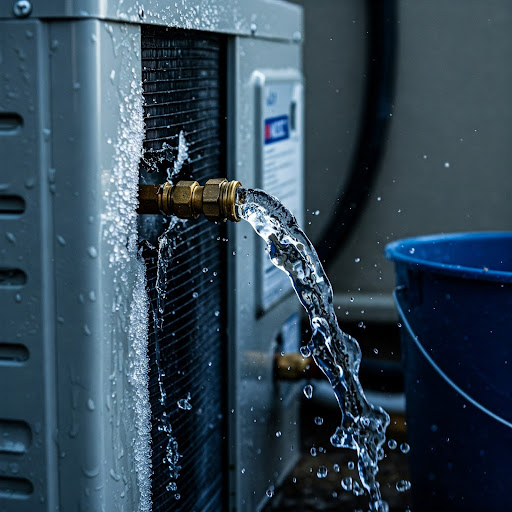
Why Is My Heat Pump Leaking Water Inside?
Your heat pump is a crucial component of your home’s HVAC system, designed to keep you comfortable year-round. Regular maintenance ensures that it runs efficiently, but sometimes, issues arise—one of the most common being water leakage inside your home. If you notice moisture near your heat pump, it’s essential to address it immediately, as it can lead to water damage and signal a more significant problem. Ignoring a leaking heat pump can result in mold growth, structural damage, and higher energy bills. The sooner you identify the cause, the more likely you can prevent costly repairs. Below are some common reasons why your heat pump may be leaking water inside.1. Clogged Drain Line
A clogged drain line is the most common cause of a leaking heat pump. Over time, dirt, debris, and calcium deposits can accumulate in the drain line, preventing proper drainage. When this happens, condensation has nowhere to go, leading to water buildup inside your home. If you notice water pooling near your indoor unit, it may be time to check the drain line. Regular maintenance can help keep it clear, and a wet/dry vacuum can often remove minor blockages.2. Damaged or Rusted Drain Pan
The drain pan is responsible for collecting excess condensation and directing it to the drain line. If the pan becomes cracked, rusted, or misaligned, water may leak before it reaches the drain line. If you suspect a damaged drain pan, an HVAC technician can inspect and replace it. Addressing the issue early can help prevent further complications.3. Frozen Evaporator Coils
If your heat pump’s refrigerant levels are too low or there’s restricted airflow, the evaporator coils may freeze. When the ice melts, it can overflow the drain pan and cause water leakage inside your home. To prevent this, it’s important to ensure your system has proper airflow and refrigerant levels. If freezing occurs, a technician can check for leaks and make necessary adjustments.4. Dirty Coils & Air Filters
Evaporator coils play a critical role in your heat pump’s efficiency. When they become dirty, they struggle to absorb heat properly, which can lead to freezing and subsequent water leakage. Clogged air filters can also contribute to airflow issues, causing similar problems. Cleaning or replacing filters regularly helps maintain efficiency and prevents these issues from developing.5. Blocked or Closed Vents
Your heat pump requires unrestricted airflow to function correctly. If vents are closed or blocked by furniture, the system will work harder to maintain the desired temperature, potentially leading to condensation issues and leaks. Make sure vents remain open and unblocked to maintain proper airflow. If excessive dust buildup occurs inside the vents, a professional cleaning may improve efficiency.6. Broken or Leaking Refrigerant Lines
Refrigerant lines play a crucial role in heat exchange within your system. If they develop leaks or break, your heat pump may struggle to regulate temperature, resulting in ice buildup on the coils and eventual water leakage when it melts. A professional inspection is necessary to repair refrigerant lines properly. In British Columbia, refrigerant leaks must be handled by certified technicians due to environmental regulations.7. Uneven Air Handler Installation
An improperly leveled air handler can cause drainage problems. If water isn’t directed properly toward the drain line, it can pool in unintended areas, leading to leaks inside your home. An HVAC technician can adjust and level your air handler to ensure proper drainage and prevent unnecessary leaks.British Columbia-Specific HVAC Regulations & Best Practices
If you live in BC, it’s important to follow provincial guidelines for heat pump maintenance:- Ozone-Depleting Substances Regulation: Refrigerant leaks must be repaired by a licensed technician to prevent environmental damage (source).
- Better Homes BC Program: Homeowners may be eligible for rebates when upgrading or maintaining heat pumps for energy efficiency (source).